- Home
- Claire North
Touch
Touch Read online
Claire North is the pen name of Catherine Webb. She currently works as a theatre lighting designer and is a fan of big cities, urban magic, Thai food and graffiti-spotting. She lives in London.
Find out about Claire North and other Orbit authors by registering for the free monthly newsletter at www.orbitbooks.net.
BY CLAIRE NORTH
The First Fifteen Lives of Harry August
Touch
COPYRIGHT
Published by Orbit
978-0-3565-0457-5
All characters and events in this publication, other than those clearly in the public domain, are fictitious and any resemblance to real persons, living or dead, is purely coincidental.
Copyright © 2015 by Claire North
The moral right of the author has been asserted.
All rights reserved. No part of this publication may be reproduced, stored in a retrieval system, or transmitted, in any form or by any means, without the prior permission in writing of the publisher.
The publisher is not responsible for websites (or their content) that are not owned by the publisher.
ORBIT
Little, Brown Book Group
100 Victoria Embankment
London, EC4Y 0DY
www.littlebrown.co.uk
www.hachette.co.uk
Touch
Table of Contents
About the Author
BY CLAIRE NORTH
COPYRIGHT
Chapter 1
Chapter 2
Chapter 3
Chapter 4
Chapter 5
Chapter 6
Chapter 7
Chapter 8
Chapter 9
Chapter 10
Chapter 11
Chapter 12
Chapter 13
Chapter 14
Chapter 15
Chapter 16
Chapter 17
Chapter 18
Chapter 19
Chapter 20
Chapter 21
Chapter 22
Chapter 23
Chapter 24
Chapter 25
Chapter 26
Chapter 27
Chapter 28
Chapter 29
Chapter 30
Chapter 31
Chapter 32
Chapter 33
Chapter 34
Chapter 35
Chapter 36
Chapter 37
Chapter 38
Chapter 39
Chapter 40
Chapter 41
Chapter 42
Chapter 43
Chapter 44
Chapter 45
Chapter 46
Chapter 47
Chapter 48
Chapter 49
Chapter 50
Chapter 51
Chapter 52
Chapter 53
Chapter 54
Chapter 55
Chapter 56
Chapter 57
Chapter 58
Chapter 59
Chapter 60
Chapter 61
Chapter 62
Chapter 63
Chapter 64
Chapter 65
Chapter 66
Chapter 67
Chapter 68
Chapter 69
Chapter 70
Chapter 71
Chapter 72
Chapter 73
Chapter 74
Chapter 75
Chapter 76
Chapter 77
Chapter 78
Chapter 79
Chapter 80
Chapter 81
Chapter 82
Chapter 83
Chapter 84
Chapter 85
Chapter 86
Chapter 87
Chapter 88
Chapter 1
Josephine Cebula was dying, and it should have been me.
She had two bullets in the chest, one in the leg, and that should have been the end of it, should have been enough, but the gunman had stepped over her expiring form and was looking for me.
For me.
I cowered in the body of a woman with swollen ankles and soft flabby wrists, and watched Josephine die. Her lips were blue, her skin was white, the blood came out of the lower gunshot to her stomach with the inevitability of an oil spill. As she exhaled, pink foam bubbled across her teeth, blood filling her lungs. He – her killer – was already moving on, head turning, gun raised, looking for the switch, the jump, the connection, the skin, but the station was a shoal of sardines breaking before a shark. I scattered with the crowd, stumbling in my impractical shoes, and tripped, and fell. My hand connected with the leg of a bearded man, brown-trousered and grey-haired, who perhaps, in another place, bounced spoilt grandchildren happily upon his knee. His face was distended with panic, and now he ran, knocking strangers aside with his elbows and fists, though he was doubtless a good man.
In such times you work with what you have, and he would do.
My fingers closed round his ankle, and I
jumped
slipping into his skin without a sound.
A moment of uncertainty. I had been woman; now I was man, old and frightened. But my legs were strong, and my lungs were deep, and if I had doubted either I wouldn’t have made the move. Behind me, the woman with swollen ankles cried out. The gunman turned, weapon raised.
What does he see?
A woman fallen on the stairs, a kindly old man helping her up. I wear the white cap of the hajj, I think I must love my family, and there is a kindness in the corner of my eye that terror cannot erase. I pulled the woman to her feet, dragged her towards the exit, and the killer saw only my body, not me, and turned away.
The woman, who a second ago I had been, shook away enough of her confusion to look up into my stranger’s face. Who was I? How did I come to be helping her? She had no answer, and finding only fear, gave a howl of she-wolf terror and pulled away, scratching at my chin. Breaking free, she ran.
Above, in the square portal of light at the top of the stairs: police, daylight, salvation.
Behind: a man with a gun, dark brown hair and synthetic black jacket, who wasn’t running, wasn’t firing, but was looking, looking for the skin.
On the stairs, Josephine’s spreading blood.
The blood in her throat sounded like popping candy when she breathed, barely audible over the racket of the station.
My body wanted to run, thin walls of an ageing heart pumping fast against a bony chest. Josephine’s eyes met mine, but she didn’t see me there.
I turned. Went back to her. Knelt at her side, pressed her hand over the wound nearest her heart, and whispered, “You’ll be OK. You’ll be all right.”
A train was approaching through the tunnel; I marvelled that no one had stopped the line. Then again the first shot had been fired not thirty seconds ago, and it would take almost as long to explain it as to live it.
“You’ll be OK,” I lied to Josephine, whispering soft German in her ear. “I love you.”
Perhaps the driver of the oncoming train didn’t see the blood on the stairs, the mothers holding their children close as they cowered behind grey pillars and fluorescent vending machines. Perhaps he did see it, but like a hedgehog before a cement lorry was so bewildered by the events, he couldn’t manage an independent original thought and so, training overriding initiative, he slowed down.
Faced with sirens above and a train below, the man with the gun looked around the station once more, did not see what he wanted, turned and ran.
The train doors opened, and he climbed on board.
Josephine Cebula was dead.
I followed her killer on to the train.
Chapter 2
Three and a half months before she died, a stranger’s hand pressing on he
rs, Josephine Cebula said, “It’s fifty euros for the hour.”
I was sitting on the end of the hotel bed, remembering why I didn’t like Frankfurt. A few beautiful streets had been restored after the war by a mayor with a sense of undefeated civic pride, but time had moved too fast, the needs of the city too great, and so a bare quarter-mile of Germanic kitsch had been rebuilt, celebrating a lost culture, a fairy-tale history. The rest was pure 1950s tedium, built in straight lines by men too busy to think of anything better.
Now grey concrete executives sat within grey concrete walls, quite possibly discussing concrete, there not being much else in Frankfurt to get enthused about. They drank some of the least good beer Germany had to offer, in some of the dullest bars in Western Europe, rode buses that came on time, paid three times the going rate for a cab out to the airport, were weary when they came, and glad when they departed.
And within all this was Josephine Cebula, who said, “Fifty euros. Not negotiable.”
I said, “How old are you?”
“Nineteen.”
“How old are you really, Josephine?”
“How old do you want me to be?”
I added up her dress, which was in its own way expensive, in that so little fabric worn on purpose could only be the consequence of high fashion. A zip ran down one side, tight against her ribs and the curve of her belly. Her boots were tight around her calves, forcing them to bulge uncomfortably just below the knee. The heel was too high for good balance, which showed in her uneasy posture. I mentally stripped her of these poor choices, pulled her chin up high, washed the cheap dye from her hair and concluded that she was beautiful.
“What’s your cut?” I asked.
“Why?”
“Your accent isn’t German. Polish?”
“Why so many questions?”
“Answer them and three hundred euros are yours, right now.”
“Show me.”
I laid out the money, a note at a time, in clean fifty bills on the floor between us.
“I get forty per cent.”
“You’re on a bad deal.”
“Are you a cop?”
“No.”
“A priest?”
“Far from.”
She wanted to look at the money, wondered how much more I held, but managed to keep her eyes on me. “Then what?”
I considered. “A traveller,” I said at last. “Looking for a change of scenery. Your arms – needle marks?”
“No. I gave blood.”
A lie, one I didn’t need to call her on, it was so weak in both conception and delivery. “May I see?”
Her eyes flickered to the money on the floor. She held out her arms. I examined the bruise in the nook of her elbow, felt the skin, so thin I was amazed my touch didn’t dent it, saw no sign of more extensive needle use. “I’m clean,” she murmured, her eyes now fixed on mine. “I’m clean.”
I let her hands go; she hugged her arms around her chest. “I don’t do any stupid stuff.”
“What kind of stupid stuff?”
“I don’t sit around and talk. You’re here for business; I’m here for business. So, let’s do business.”
“All right. I want your body.”
A shrug; this was nothing new. “For three hundred I can stay the night but I need to tell my guys.”
“No. Not for the night.”
“Then what? I don’t do long term.”
“Three months.”
A snort of a laugh; she’d forgotten what humour sounded like. “You’re crazy.”
“Three months,” I repeated. “Ten thousand euros upon completion of contract, a new passport, new identity, and a fresh start in any city you name.”
“And what would you want for this?”
“I said: I want your body.”
She turned her face away so that I might not spot the fear that ran down her throat. For a moment she considered, money at her feet, stranger sitting on the end of her bed. Then, “More. Tell me more, and I’ll think about it.”
I held out my hand, palm up. “Take my hand,” I said. “I’ll show you.”
Chapter 3
That had been three months ago.
Now Josephine was dead.
Taksim station has very little to recommend it.
In the morning dull-eyed commuters bounce off each other as they ride down the Bosphorus, shirts damp from the packed people carriers that serve Yenikoy and Levent. Students bound through the Metro in punk-rock T-shirts, little skirts and bright headscarves towards the hill of Galata, the coffee shops of Beyoglu, the iPhone store and the greasy pide of Siraselviler Caddesi, where the doors never close and the lights never die behind the plate-glass windows of the clothes stores. In the evening mothers rush to collect the children two to a pram, husbands stride with briefcases bouncing, and the tourists, who never understood that this is a working city and are only really interested in the funicular, cram together and grow dizzy on the smell of shared armpit.
Such is the rhythm of a thriving city, and it being so, the presence of a murderer on the train, gun tucked away inside a black baseball jacket, head bowed and hands steady, causes not a flicker as the Metro pulls clear of Taksim station.
I am a kindly old man in a white cap; my beard is trimmed, my trousers are only slightly stained with blood where I knelt by the side of a woman who was dead. There is no sign that sixty seconds ago I ran through Taksim in fear of my life, save perhaps a protrusion in the veins on my neck and a sticky glow to my face.
Some few metres from me – very few, yet very many by the count of bodies that kept us apart – stood the man with the gun beneath his jacket, with nothing in his look to show that he had just shot a woman in cold blood. His baseball cap, pulled down over his eyes, declared devotion to Gungorenspor, a football team whose deeds were forever greater in the expectation than the act. His skin was fair, recently tanned by some southern sun and more recently learning to forget the same. Some thirty people filled the space between us, bouncing from side to side like wavelets in a cup. In a few minutes police would shut down the line to Sanayii. In a few minutes someone would see the blood on my clothes, observe the fading red footprint I left with every step.
It wasn’t too late to run.
I watched the man in the baseball cap.
He too was running, though in a very different manner. His purpose was to blend with the crowd, and indeed, hat pulled down and shoulders curled forward, he might have been any other stranger on the train, not a murderer at all.
I moved through the carriage, placing each toe carefully in the spaces between other people’s feet, a swaying game of twister played in the busy silence of strangers trying not to meet each other’s eyes.
At Osmanbey the train, rather than growing emptier, pressed in tighter with a flood of people, before pulling away. The killer stared out the window at the blackness of the tunnel, one hand grasping the bar above, one resting in his jacket, finger perhaps still pressed to the trigger of his gun. His nose had been broken, then restored, a long time ago. He was tall without being a giant, hanging his neck and slouching his shoulders to minimise the effect. He was slim without being skinny, solid without being massy, tense as a tiger, languid as a cat. A boy with a tennis racket under one arm knocked against him, and the killer’s head snapped up, fingers curling tight inside his jacket. The boy looked away.
I eased my way around a doctor on her way home, hospital badge bouncing on her chest, photo staring with grim-eyed pessimism from its plastic heart, ready to lower your expectations. The man in the baseball cap was a bare three feet away, the back of his neck flat, his hair trimmed to a dead stop above his topmost vertebrae.
The train began to decelerate, and as it did, he lifted his head again, eyes flicking around the carriage. So doing, his gaze fell on me.
A moment. First stony nothing, the stare of strangers on a train, devoid of character or soul. Then the polite smile, for I was a nice old man, my story written in my skin, a
nd in smiling he hoped I would go away, a contact made, an instant passed. Finally his eyes traced their way to my hands, which were already rising towards his face, and his smile fell as he saw the blood of Josephine Cebula drying in great brown stripes across my fingertips, and as he opened his mouth and began to draw the gun from his shoulder holster I reached out and wrapped my fingers around the side of his neck and
switched.
A second of confusion as the bearded man with blood on his hands, standing before me, lost his balance, staggered, bounced off the boy with the tennis racket, caught his grip on the wall of the train, looked up, saw me, and as the train pulled into Sisli Mecidiyekoy, and with remarkable courage considering the circumstances, straightened up, pointed a finger into my face and called out, “Murderer! Murderer!”

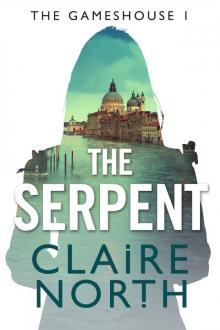 Gamehouse 01 - The Serpent
Gamehouse 01 - The Serpent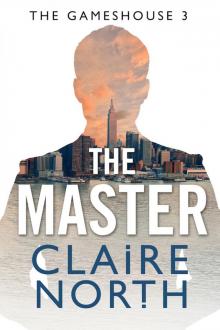 The Master
The Master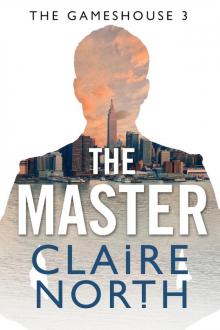 Gamehouse 03 - The Master
Gamehouse 03 - The Master The Thief
The Thief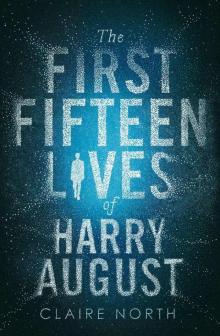 The First Fifteen Lives of Harry August
The First Fifteen Lives of Harry August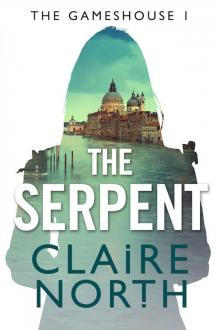 The Serpent
The Serpent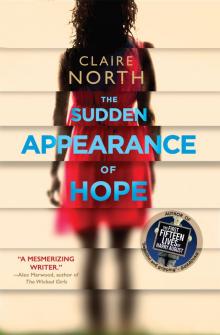 The Sudden Appearance of Hope
The Sudden Appearance of Hope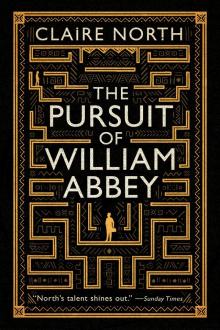 The Pursuit of William Abbey
The Pursuit of William Abbey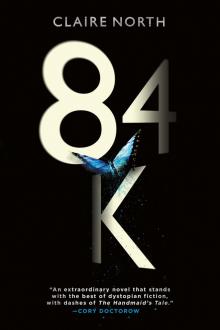 84k
84k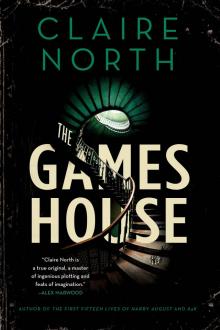 The Gameshouse
The Gameshouse Touch
Touch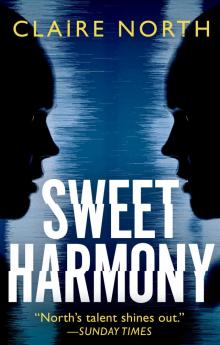 Sweet Harmony
Sweet Harmony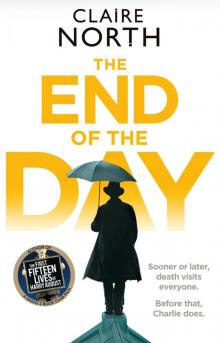 The End of the Day
The End of the Day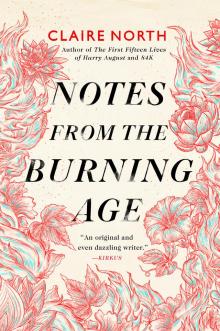 Notes from the Burning Age
Notes from the Burning Age